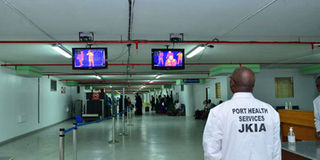Kenya on high Ebola alert over DRC outbreak, to screen travellers

Thermal cameras for screening passengers for possible Ebola symptoms at the Jomo Kenyatta International Airport (JKIA) in Nairobi on December 3, 2014 following the worst-ever Ebola outbreak in West Africa that killed more than 11,300 people. FILE PHOTO | SALATON NJAU | NMG
What you need to know:
Kenya is on a high alert following an Ebola outbreak that has killed 17 people in the Democratic Republic of Congo.
Nairobi. Kenya is on a high alert following an Ebola outbreak that has killed 17 people in the Democratic Republic of Congo.
In a statement on Wednesday, Health Cabinet Secretary Sicily Kariuki said the ministry will be conducting routine screening of all travellers at points of entry including at the Jomo Kenyatta International Airport (JKIA), and Busia and Malaba along Kenya's border with Uganda.
“In these places, we have installed thermal guns to detect any person with elevated temperatures,” said Ms Kariuki.
The ministry will also established a National Health Emergencies Council whose task will be to prevent the spread of the deadly diseases in the country.
DR Congo declared the outbreak of the Ebola haemorrhagic fever in Bikoro in the northwestern Equateur province on Tuesday.
Some 21 suspected cases have been recorded.
The World Health Organisation (WHO) confirmed the presence of the Ebola on Tuesday after lab tests revealed that two samples of five collected from patients in DRC had contracted the virus.
The Ebola virus is highly infectious and very deadly.
It is contracted by contact with bodily fluids — touching a sick or dead person is a well-known source of infection.
Following an incubation period of between two and 21 days, Ebola develops into a high fever, weakness, intense muscle and joint pain, headaches and a sore throat.
That is often followed by vomiting and diarrhoea, skin eruptions, kidney and liver failure, and internal and external bleeding.
In Tanzania, health minister Ms Ummy Mwalimu is expected to issue a statement on Thursday.
-Additional reporting by AFP.




